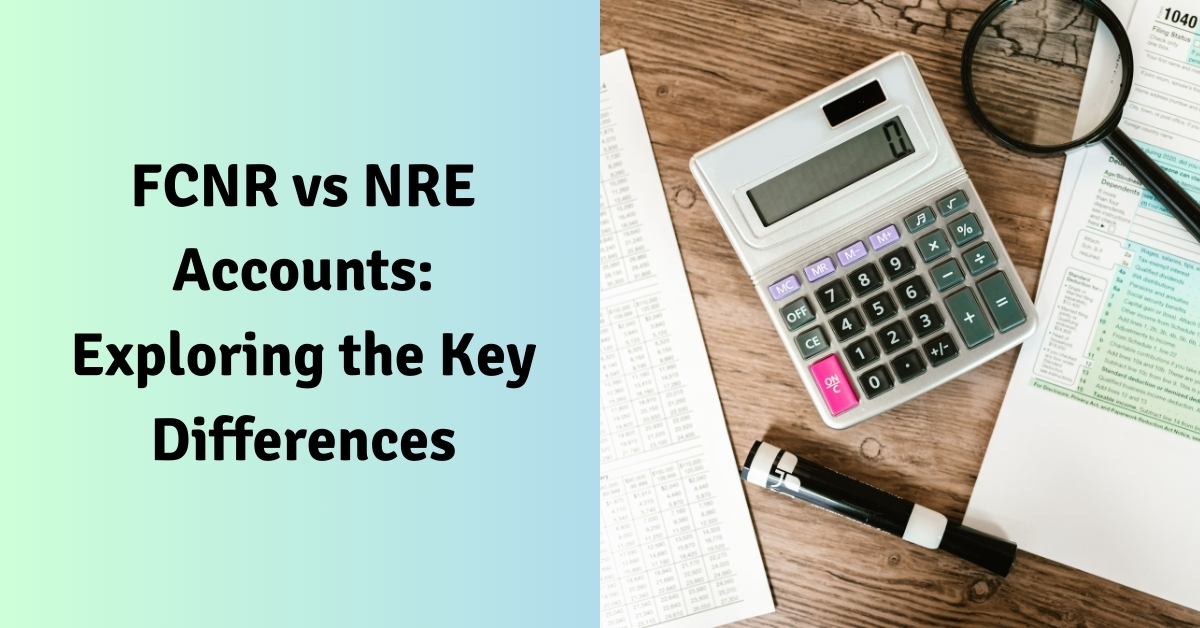FCNR vs NRE Accounts: Exploring the Key Differences

NRI deposits have shown a consistent upward trend, reaching about USD 137 billion in 2021, according to Reserve Bank of India reports. While both FCNR and NRE accounts offer distinct advantages, selecting the most suitable one depends on your financial objectives and needs.
For Non-Resident Indians (NRIs), the selection of an appropriate bank account is crucial for managing their overseas earnings. FCNR (Foreign Currency Non-Resident) and NRE (Non-Resident External) accounts are two popular choices.
Although both cater to NRI’s needs, they provide different benefits and features.
This article will explore:
Contrasts Between FCNR and NRE Accounts Primary Features of FCNR Accounts Primary Features of NRE Accounts Risk Tolerance Considerations
What is an NRE Account?
An NRE (Non-Resident External) account is a banking option for NRIs to hold their earnings in Indian Rupees. It’s designed to enable the transfer of foreign earnings to India and is commonly utilized for savings, investment income, and other India-based income sources.
What is an FCNR Account?
An FCNR (Foreign Currency Non-Resident) account is a fixed deposit account available to NRIs in India. This account allows deposits in foreign currencies like USD, GBP, EUR, JPY, and others. The main purpose of an FCNR account is to offer NRIs a secure and efficient method to save their foreign earnings without exposure to currency exchange rate fluctuations.
Contrasts Between FCNR and NRE Accounts?
Understanding the key differences between FCNR and NRE accounts is vital for NRIs aiming to effectively manage their overseas earnings. Here’s an overview of each account type to get you started:
FCNR:
- Maintainable in various foreign currencies
- Offers attractive fixed interest rates, tax-free in India
- Principal and interest are fully repatriable
- Protects against currency exchange rate fluctuations
NRE:
- Held in Indian Rupees
- Provides competitive interest rates, tax-free in India
- Principal and interest are fully repatriable
- Facilitates easy transfer of foreign earnings to India and conversion to Indian Rupees
Risk Tolerance Considerations?
Understanding your risk tolerance is essential when choosing between financial instruments like FCNR and NRE accounts. The main difference lies in currency risk and interest rate risk:
FCNR Accounts: Held in foreign currencies, suitable for NRIs wanting to avoid currency risk from fluctuating exchange rates. These accounts offer stability and protection against currency depreciation, ideal for those with lower risk tolerance.
NRE Accounts: Held in Indian Rupees, offering tax-free interest, attractive to NRIs. However, account values can change with Indian Rupee exchange rate fluctuations. Suitable for NRIs comfortable with this risk and expecting Indian Rupee strengthening.
Assessing Your Risk Tolerance: You can take a risk tolerance questionnaire or consult a financial advisor to determine your risk tolerance. These assessments help gauge your comfort with potential losses, investment knowledge, and financial goals.
Conclusion
FCNR accounts provide stability and protection against currency fluctuations, ideal for risk-averse NRIs.
Conversely, NRE accounts offer flexibility and potentially higher returns, suitable for those comfortable with currency exchange risks.
Understanding the differences between FCNR and NRE accounts enables you to make an informed decision that best fits your financial needs.
FAQs’
Q1. How do currency options differ between FCNR and NRE accounts? Ans- FCNR allows deposits in various foreign currencies, helping NRIs mitigate exchange rate uncertainties. NRE only accepts Indian Rupees (INR), converting foreign currency deposits to INR at the prevailing exchange rate.
Q2. What are the interest rate differences between FCNR and NRE accounts? Ans- FCNR interest rates vary by currency and tenure, typically offering attractive tax-free returns in India. NRE accounts provide competitive interest rates comparable to domestic savings accounts, varying by duration and bank, also tax-free in India.
Q3. How are funds repatriated from FCNR and NRE accounts? Ans- Both accounts allow unrestricted repatriation of principal and interest, facilitating efficient global fund management for NRIs.
Q4. Can both FCNR and NRE accounts be used for investment in India? Ans- NRE accounts are commonly used for investments in India, including real estate, stocks, and mutual funds. FCNR accounts, while primarily for holding foreign currency, can be converted to INR for investment purposes.
Q5. What are the tax implications for interest earned on FCNR and NRE accounts? Ans- Interest earned on both accounts is exempt from Indian income, wealth, or gift taxes, offering significant tax advantages for non-resident Indians.
Q6. How does the process of opening FCNR and NRE accounts differ? Ans- Both accounts generally require proof of NRI status, a valid passport, visa, and address proof. The processes are similar, with slight variations between banks.
Q7. Are there restrictions on deposits and withdrawals for FCNR and NRE accounts? Ans- FCNR Accounts only offer time deposits, meaning funds are typically held for a specific term. NRE accounts provide various savings and fixed deposit options, allowing convenient deposits and withdrawals.
Q8. Can an individual hold both FCNR and NRE accounts simultaneously? Ans- Yes, NRIs can hold both FCNR and NRE accounts simultaneously, enabling management of savings in both foreign and Indian currencies.
Q9. How do exchange rate changes affect FCNR and NRE accounts?
Ans- FCNR accounts avoid exchange rate risks because they hold funds in foreign currencies, providing stability. NRE accounts, held in Indian Rupees, are affected by exchange rate changes, making them suitable for those who can handle this risk.
Q10. What happens to FCNR and NRE accounts if an NRI moves back to India?
Ans- If an NRI returns to India, they can keep their FCNR account until it matures, then switch it to a Resident Foreign Currency (RFC) account. The NRE account must be converted to a resident account or closed, with the option to transfer the money to a Resident Rupee account.



